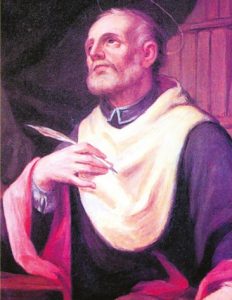St John of Kanty was born in Kenty, Poland, in 1403 and died in Cracow in 1473. He was beatified in 1676 and canonized in 1767.
His feast day is celebrated on December 23. Known for his humility, charity, and teaching, he dedicated his life to education and faith.
| St John of Kanty (Cantius) Biography | |
|---|---|
 |
|
| Date of Birth | June 23, 1390 |
| Place of Birth | Poland |
| Profession | Polish priest, scholastic philosopher, physicist and theologian |
| Place of Work | Poland |
| Date of Death | December 24, 1473 (aged 83) |
| Place of Death | Kraków Academy, Poland |
| Feast Day | December 23 |
| Beatification | By Pope Clement X on March 28 1676 in Rome |
| Canonization | By Pope Clement XIII in 1767 in Rome |
| Patron Saint of | Poland; Lithuania; Jagiellonian University |
St John of Kanty Life History
Saint John of Kanty was born in 1403 in Kenty, Poland. He studied at the University of Cracow, where he excelled in his studies through hard work and intelligence. His humility and virtuous character won him the affection and respect of those around him.
After his education, he briefly became the priest of a parish, but the responsibility overwhelmed him. So, he returned to teaching at the university in Cracow, where he lived a life marked by quiet virtue, self-denial, and generosity.
His deep love for the Pope led him to make several pilgrimages to Rome, always on foot and alone. He also once travelled to Jerusalem, driven by his devotion to Christ’s Passion, hoping to preach to the Turks and become a martyr. He died in 1473 at the age of 70.
In 1431, John was unfairly dismissed from his teaching position and sent to a small town called Olkusz in Bohemia. Rivals, jealous of his popularity with students, falsely accused him, and he was not allowed to defend himself.
The people of Olkusz were suspicious of him, knowing he came from the prestigious Cracow University. They were also used to receiving priests who had been sent there as punishment.
Although John had every reason to be angry, he decided that his parishioners would not suffer because of the injustice done to him.
He approached his new role with humility and dedication, even though the townspeople remained cold and unfriendly for years. John didn’t let this discourage him.
He showed genuine care and concern for the people in everything he did. He remained patient, never showing anger or frustration.
He knew that love could not be forced, so he gave them kindness and hoped they would eventually find that same kindness in themselves.
After eight years of hard work, John was cleared of all charges and allowed to return to Cracow. The people of Olkusz, who had grown to love him, followed him for miles, begging him not to leave.
Back in Cracow, John spent the rest of his life teaching sacred Scripture. He became well-liked and was often invited to dine with nobility.
On one occasion, a servant refused to let him in because his clothes were old and worn. John simply went home, changed into better clothes, and returned.
During the dinner, a servant spilt food on his new clothes. John laughed and said, “No matter, my clothes deserve a meal too. If it weren’t for them, I wouldn’t be here.”
John was also known for his generosity. One day, while sitting down to eat, he saw a beggar passing by. Without a second thought, he rushed out and gave the man his food. He never asked questions or hesitated to help; he simply gave what he had.
John’s teachings to his students focused on fighting error with patience, kindness, and love. He believed harshness would damage one’s own soul and undermine even the best causes. He encouraged his students to approach others with compassion rather than anger.
John dedicated himself fully to a difficult job that others might have considered beneath him. His example encourages us to try something new or face something we fear, whether it’s a different form of prayer or serving others in a way we haven’t before.
St John of Kanty (Cantius) is the Patron Saint of
- Poland;
- Lithuania;
- Jagiellonian University
Today’s St John of Kanty Quote:
The Roman Breviary distinguishes him with three hymns; he is the only confessor, not a bishop, who has been given this honour in the Roman Catholic liturgy
Prayer:
St John of Kanty, you were treated unfairly and lost your job. Please pray for those who are unemployed or afraid of losing their jobs, so they may find fulfilling work. Guide us in finding ways to help those seeking employment. Amen.
Powered By SEO Experts
Follow @ReadingCatholic
